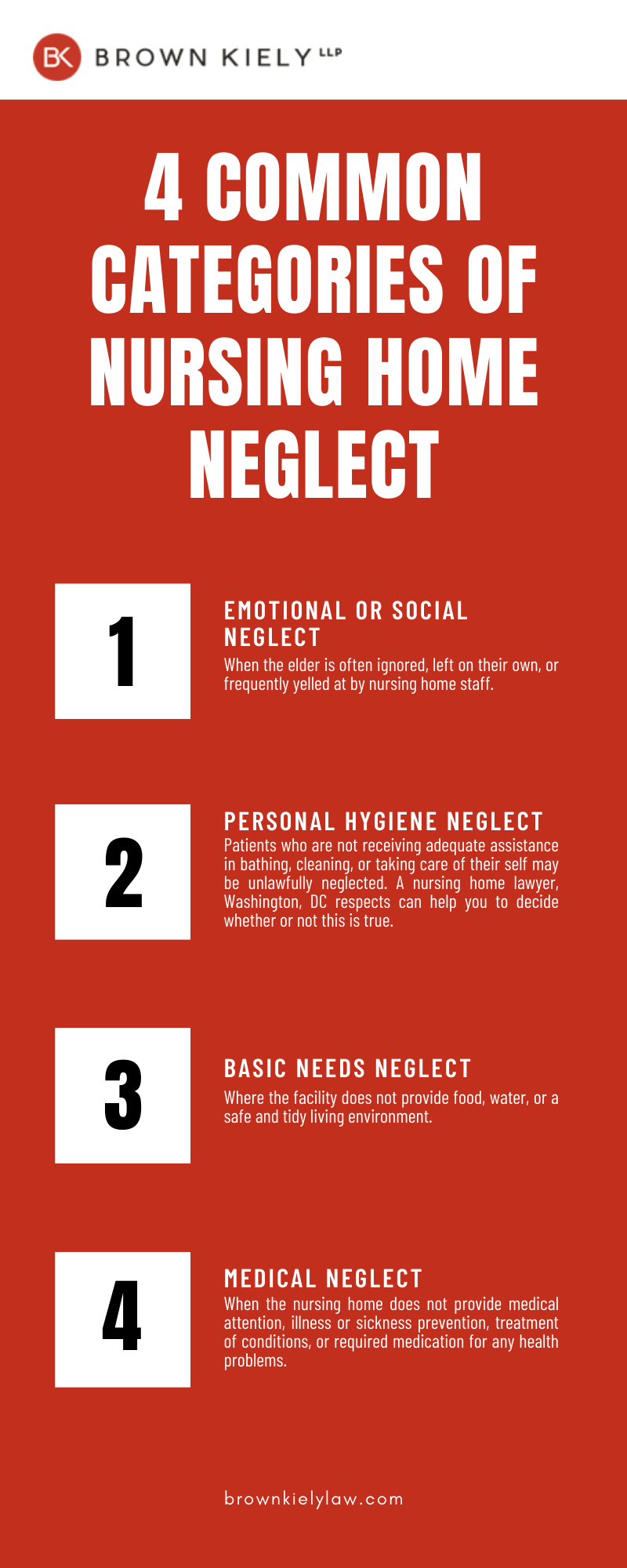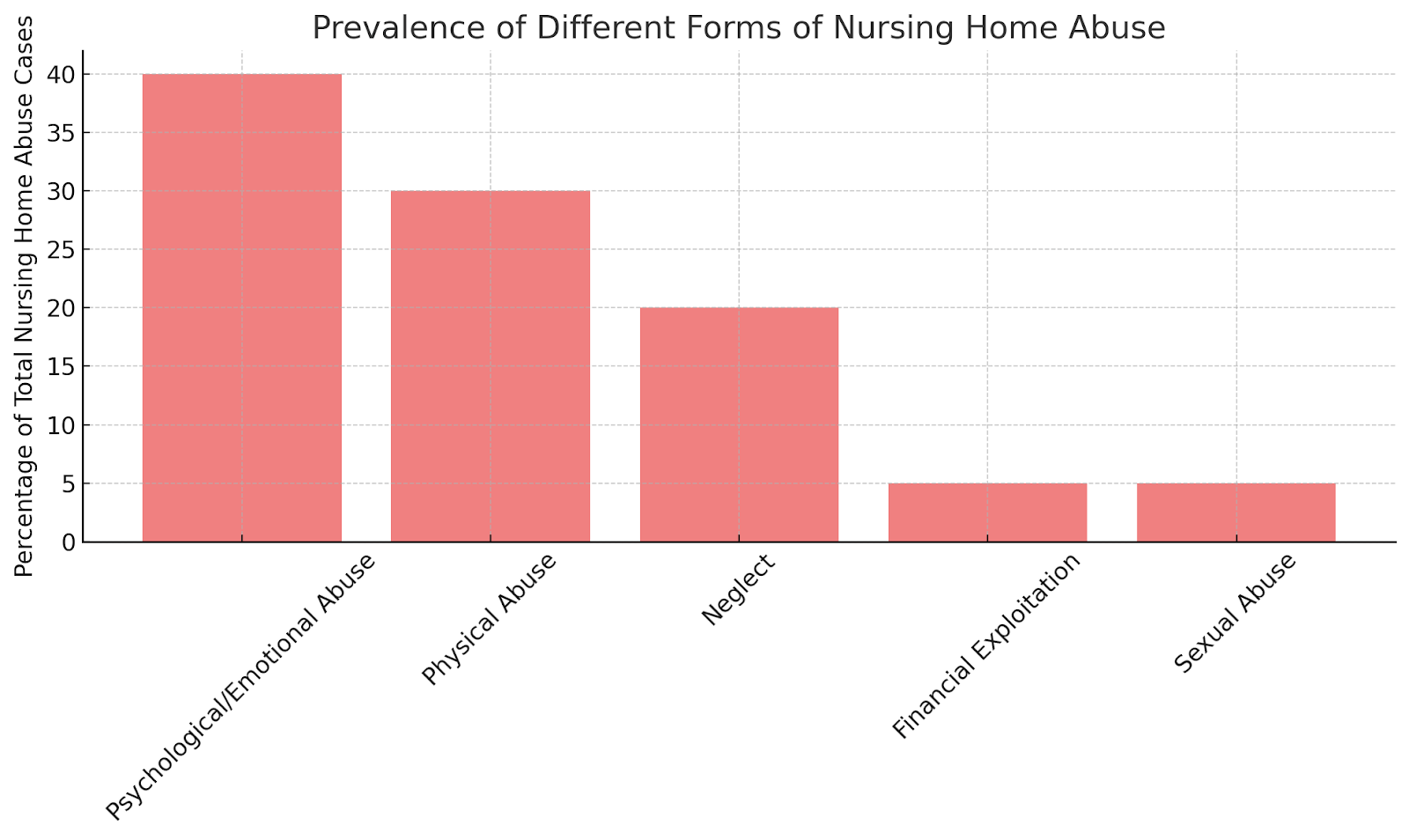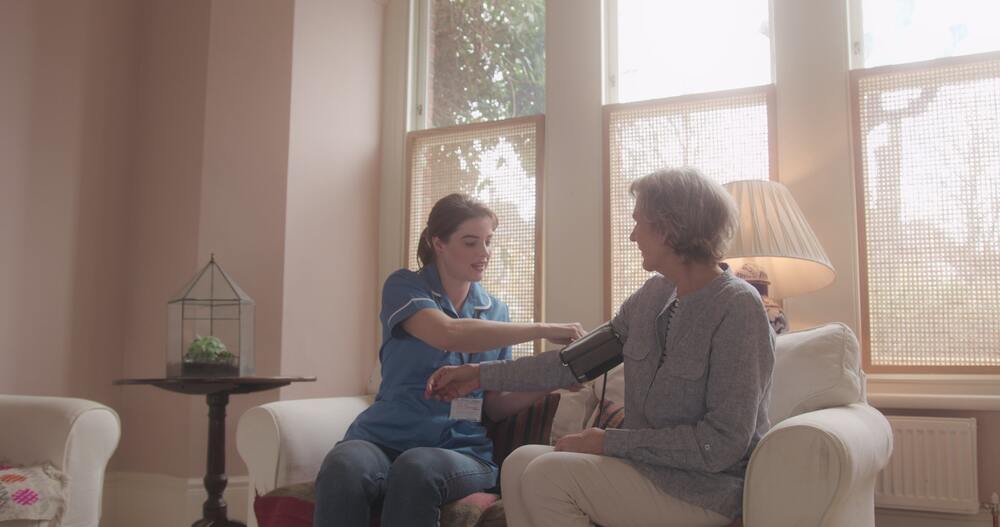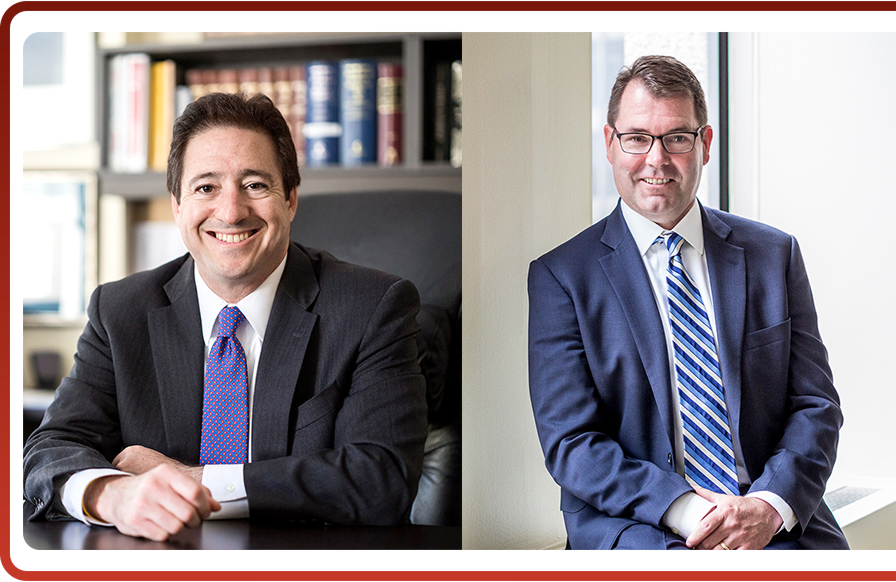
Washington DC Nursing Home Lawyer

Nursing Home Lawyer Washington, DC
At Brown Kiely LLP, our team of dedicated attorneys has been protecting the rights of seniors and their families across Maryland and Washington, D.C. since 1998. Our trusted Washington DC nursing home lawyer brings decades of litigation experience and a proven track record of success to every case. With millions recovered for victims of neglect and abuse, our firm combines the resources of a seasoned litigation boutique with the personal attention each client deserves.
Meet Brown Kiely, LLP
Brown Kiely, LLP is the personal injury law firm in Washington, DC residents turn to for the most comprehensive advice. Having years of dedicated experience in personal injury claims, which includes nursing home abuse or neglect, we understand their sensitive nature. Regardless of how much proof you might have, or whether or not you might have a claim, we encourage you to call one of our lawyers as soon as possible. Rest assured you can feel confident in knowing we can be ready to offer you:
- Compassion and honest legal advice
- Frequent communication efforts
- Dedicated investigation of your claim backed by reputable resources
- A commitment to getting you and your family justice
- Successful trial experience in the event that a settlement is not possible
- Maximum possible compensation for your loved ones’ losses
To speak with our nursing home attorney, Washington, DC trusts now, please call 410-625-9330.
Nursing Home Neglect and Abuse
Up to one in ten elders are abused or neglected while living in a nursing home. This is completely unacceptable, which is why our law firm works so diligently to make sure as many perpetrators are brought to justice as possible. Nursing home abuse and neglect can vary in its details, but there are generally four common categories:
Emotional or Social Neglect: When the elder is often ignored, left on their own, or frequently yelled at by nursing home staff.
Personal Hygiene Neglect: Patients who are not receiving adequate assistance in bathing, cleaning, or taking care of their self may be unlawfully neglected. Our personal injury attorney can help you to decide whether or not this is true.
Basic Needs Neglect: Where the facility does not provide food, water, or a safe and tidy living environment.
Medical Neglect: When the nursing home does not provide medical attention, illness or sickness prevention, treatment of conditions, or required medication for any health problems.
In addition to the aforementioned, abuse could also be a factor. This is slightly different from neglect and can include emotional, physical, financial, or a combination of one or more types of nursing home abuse. A claim might also be filed against the facility and other parties. Our Maryland nursing home lawyer can further explain the types of neglect to you during a free consultation.
Washington DC Nursing Home Law Infographic
Washington DC Nursing Home Statistics
Nursing home abuse remains a significant concern, with various forms of mistreatment affecting vulnerable residents. Research indicates that approximately 10% of all nursing home residents experience some form of abuse or neglect. The World Health Organization reports that 15.7% of older adults aged 60 and above have experienced abuse in community settings, with rates in institutional settings like nursing homes being notably higher.
Underreporting is a critical issue; studies suggest that only about 1 in 14 cases of nursing home abuse are reported to authorities, highlighting a significant gap in detection and intervention.
The most prevalent forms of abuse in nursing homes include psychological and emotional abuse, followed by physical abuse and neglect. Financial exploitation and sexual abuse are less common but still present concerns.
Several factors contribute to the prevalence of abuse in nursing homes, including understaffing, inadequate training, and insufficient oversight. For instance, the Centers for Medicare and Medicaid Services issued over 94,000 health citations to U.S. nursing homes in 2023, with 8.1% related to abuse, neglect, or exploitation.
Signs of Nursing Home Neglect
Identifying neglect in a nursing home can be difficult. Unfortunately, it often goes on for months or even years before detecting neglect. Some signs include, but are not limited to:
- Rapid weight loss
- Bed sores or ulcers
- Septicemia ( Learn about Septicemia Deaths in Nursing Homes)
- Malnutrition
- Poor hygiene
- Dehydration
- Withdrawn or changed behavior
- Appearing angry, upset, depressed, or sad often
- Environmental hazards (i.e. slippery floors, unsafe equipment, etc.)
Signs of Physical Abuse in a Nursing Home
After placing a senior relative in a nursing home, the very last thing any family member wants to hear is that physical abuse is happening. Some signs of nursing home abuse are more obvious than others. It can be difficult to figure out whether abuse is the root of peculiar bruises, cuts, welts and other visual injuries if your loved one remains quiet. In fact, your loved one may be so terrified to say anything to you about what is really going on, out of fear of worsened physical abuse. Here are some questions family members often ask our Washington, DC nursing home lawyer when it comes to finding out the cause of suspicious injuries and conditions:
What To Do If You See Your Loved One Has Bruises That Have Gone Unreported?
There is always a chance that these physical bruises did not occur because of something your loved one did themselves. Nursing home staff may become frustrated with a resident that is not obliging and pinch, slap, or hit them into cooperating. Some physical injuries may not be so direct, where bruises arise due to intentionally over-tightening restraint straps. Abuse can occur at nursing home facilities where staff are not fully trained or are overworked due to being understaffed altogether.
What To Do If Your Loved One Was Diagnosed With Nutritional Deficiencies
Another way that physical abuse may be happening is if staff are purposefully or accidentally not providing food for residents at every meal. What may result over time is newly diagnosed conditions related to nutritional deficiency. Your loved one may seem exhausted, have odd colored skin, be dehydrated, or otherwise appear as though they are not getting necessary nutrients every day.
What To Do If Your Loved One Has Become Distant and Depressed
A loved one who has recently been transferred to a nursing home facility may have trouble adjusting initially. However, there is a difference between some sadness over the life change, and becoming distant or refusing to take phone calls from family members. These could be serious signs that your loved one is suffering from physical abuse and is too afraid to tell, so they retreat into isolation as a way of coping.
Determining When a Nursing Home is Liable for Elder Abuse or Neglect
For those who are not in the legal field and even lawyers who do not specialize in taking cases involving elder abuse or neglect, it can be difficult to determine when a nursing home should be held legally liable. This area of the law is especially challenging, and it is why lawyers who take nursing home cases must receive additional education and training beyond a four-year law degree. Our Washington, DC nursing home abuse lawyer has represented elders and their families and has earned a strong reputation as a result.
Below are some guidelines about determining liability and whether or not a nursing home may be legally bound to compensate an elder and their family for the damages incurred through abuse and/or neglect. However, it is important to discuss the particulars of your case with our attorney because every case is different and demands special attention.
If our nursing home lawyers determine that the care facility is liable for the elder’s damages, we will develop a claim and submit it to the facility owners. Should the owners fail in responding to the claim by offering a settlement that reflects the amount of damages, our personal injury lawyer will be prepared to file a nursing home lawsuit against them. The nature and severity of the damages varies from one case to the next but may include the costs of medical treatment, pain and suffering, disability, and more. In rare cases, punitive damages may also have merit, and the amount of compensation awarded to the elder in those scenarios will represent additional punishment of the accused.
Grounds for Filing a Nursing Home Abuse Damage Claim
In order to meet the law’s criteria for liability, a nursing home must have knowingly failed in their duty to care for the elder or failed in a way that a reasonably run nursing home would not have failed. After a review of the details of your case, our injury lawyer can determine if the facility can and should be held liable for your elder’s damages. Here are a few examples of how nursing homes often fail in their duty of care for residents:
- Negligence in their hiring practices. A nursing home is morally, ethically, and legally obligated to hire staff members and medical practitioners who are properly qualified to perform the duties of their job. They must have the required educational background suited to their job duties and they must not have any record of abuse or violence towards others. Simply failing to perform a background check on prospective employees is a clear sign of negligence.
- Insufficient staffing. An industry standard is to employ one staff member for every 1.64 residents of the nursing home. When the nursing home is consistently short staffed, it will inevitably lead to negligent care of the residents. Negligence often leads to physical and emotional injuries of the residents, any of which can be painful, permanent, and possibly fatal.
What You Need to Know About Nursing Home Abuse
More than two decades ago, a Congressional Committee published a disturbing report on elder abuse at the nation’s nursing homes. The report was the result of an investigation conducted in 1999 and 2000, revealing that residents in over 30 percent of nursing homes in the US had been the victim of some form of abuse. Since that time, things have not gotten much better; according to the National Council on Aging, 5 million nursing home residents experience some form of care facility abuse or neglect every year. If this happens to one of your elderly parents or relatives, our personal injury legal team at Brown Kiely Law LLP to help.
Elder Abuse Is a Broad Category
Abuse of elderly persons can take a number of forms, not all of which are physical. In most cases, abuse takes the form of neglect or financial exploitation. According to a story published in 2021 on Forbes.com, ten percent of people over the age of 60 have been financially victimized by caretakers or even family members. However, abuse can also take the form of bullying and intimidation as well.
Unfortunately, determining whether or not abuse has actually taken place can be a challenge. In many cases, the victim is afraid to speak out or may be confused because of cognitive or memory issuers. There are a number of signs to look for, however:
- Unusual moodiness (especially anger or depression)
- Sudden unexplained weight loss
- Dehydration
- Bed sores or infections
- Unexplained cuts and bruises
- Poor hygiene Hazards in the room
If your elderly loved one exhibits one or more of these signs, it is important to address the possibility of nursing home abuse by contacting our Washington DC nursing home lawyer at the earliest opportunity.
Four Misconceptions About Elder Abuse
When your parent or grandparent goes to live out their days in a nursing home, you have high hopes for their care. You want them to be treated well, all their needs to be met, and for them to be safe and sound. Unfortunately, that’s not always what happens. Elder abuse is a growing problem. Here are four misconceptions about the abuse of nursing home residents.
If Elders Say There’s No Abuse Happening, There’s No Abuse Happening
This is common among all abuse victims, not just the elderly. Elder abusers may threaten to withhold things such as food, water, or visits from loved ones to keep the elderly from reporting the abuse. Elder abuse is far more prevalent than you’d think. According to the National Council on Aging, approximately one in 10 elders are abused, and only one in 24 cases are ever reported. If you’re afraid your loved one is being abused, reach out to our attorneys today.
Educated Elders Do Not Fall For Scams
Anyone can fall for a scam, elderly or not, educated or not. Scams have little to do with education, as they’re based on fear , usually that something bad is going to happen to someone they care about. For example, a scammer could call and purport to be one of the elder’s grandchildren, who needs money to finish college or get bailed out of jail. Our personal injury attorney can help you determine if your loved one is being scammed.
Signs of Abuse on an Elder’s Body Are Always Easy To See
Many signs of physical abuse are difficult to detect. Some forms of physical abuse don’t leave tell-tale marks. Bruises may be attributed to age-related issues such as clumsiness or having a greater risk of falls. Withholding food from elders can cause weight loss, but so can a number of conditions endemic to elders. If you suspect that your elderly loved one is being abused, contact our team.
Caregivers Who Abuse Elders Do It Because They’re Overworked
Overwork is a convenient excuse for elder abuse, since the vast majority of caregivers are overworked. Staffing shortages in nursing homes are frighteningly common, and caregivers may have too many elders to look after. However, blaming overwork for abuse shifts the blame away from the abuser who so richly deserves the consequences of abusing the elderly in his or her care. We can help you determine who is liable for abusing your loved one.
Holding The Guilty Parties Accountable
While elder abuse is perpetrated by individual nursing home workers, it is ultimately the nursing home itself and its management who ultimately bear responsibility. The worker that actually commits the abuse can be terminated and can face criminal charges and prison time. However, the company operating the home has an obligation to screen its employees, including the performance of background checks. The facility is also required to maintain adequate staff, and see that workers are properly trained and supervised. A company failing to do these things can also be charged with a criminal violation, but that doesn’t help your family very much. This is why your best course of action is to file a civil lawsuit.
When To Seek Legal Support
Because of the complicated nature of elder law, attorneys practicing in this area must undergo additional schooling beyond law school. Lawyers at Brown Kiely Law LLP have the knowledge and experience to help families get justice for their elderly loved ones who have suffered abuse and neglect. You may be entitled to recover medical expenses as well as get compensation for pain and suffering. The court may also impose punitive damages.
If you have reason to believe your elder family member has been abused, call our office today.
What You Can Do If You Believe Your Love One is Being Abused
It may be time to meet with our Washington DC nursing home attorney if you are noticing physical symptoms of abuse in your senior loved one since being moved into a nursing home. You can also file a report to the nursing home facility about your observations. However, you may not be pleased with the response you get, especially if no actions are being taken to prevent such incidents from happening again. If you can, it may be best to move your loved one to a safe place while the abuse is being investigated further. There are legal actions you can take to see that justice is sought. Your cherished family member may even be entitled to financial restitution for the pain and suffering endured.
Nursing home neglect is completely unacceptable and if our law firm discovers such incidents to be true, we can fight tooth and nail for justice.
Washington Nursing Home Glossary
When it comes to finding a Washington DC nursing home lawyer, understanding the legal terms associated with nursing home abuse or neglect can be a valuable part of the process. At Brown Kiely LLP, we’ve worked with families throughout Washington, DC to pursue justice for their loved ones. Below, we’ve defined several terms and legal phrases often encountered in nursing home cases. These definitions are designed to clarify some of the core issues we frequently address when working with clients and their families.
Care Plan Violations
A care plan is a formal, written document developed for each nursing home resident to address their medical, personal, and emotional needs. It’s typically created by a team of professionals in cooperation with the resident and their family. A care plan violation happens when nursing home staff fail to follow the prescribed steps outlined in the plan, leading to harm or increased risk for the resident. In our experience, this is often overlooked until a loved one’s condition worsens or injuries occur. These violations are significant, as they may demonstrate a pattern of inadequate oversight or improper training within a facility.
Unexplained Injuries
When a nursing home resident suffers bruises, fractures, or other physical harm with no clear explanation, it raises immediate concern. Unexplained injuries often suggest that the individual may have been mishandled, improperly supervised, or subjected to abuse. These injuries may be dismissed as accidents, but repeated or severe incidents deserve further investigation. In many of the cases we’ve handled, family members have played a key role by noticing changes and pushing for answers when facilities failed to provide them.
Improper Medication Administration
Administering medication in a long-term care facility must be done according to physician orders, and errors can result in serious health consequences. Improper medication administration includes giving the wrong dosage, skipping doses, or providing medication to the wrong resident. These types of errors are not only dangerous but are also a violation of the resident’s right to receive appropriate medical care. We often find that such mistakes result from understaffing or poorly trained personnel, and they can form the basis of a legal claim if harm occurs.
Failure To Prevent Falls
Slip and fall accidents are one of the leading causes of injury among elderly nursing home residents. Federal guidelines require facilities to assess fall risk and implement strategies to minimize that risk, such as bed rails, floor mats, or increased monitoring. A facility’s failure to prevent falls, especially after a resident has already fallen previously, may be considered a breach of care. Our firm has seen that repeated falls often indicate a deeper issue in how the facility is managing resident safety.
Inadequate Staffing Levels
Inadequate staffing refers to situations where a nursing home does not have enough qualified personnel to meet the needs of its residents. This can lead to a wide range of problems, from delayed response times to total neglect of basic care needs. Staffing shortages are one of the most common factors we observe when evaluating whether a facility is providing substandard care. Low staff-to-resident ratios can be linked directly to incidents of missed meals, skipped hygiene routines, and undetected medical issues.
With more than 65 years of combined experience and thousands of successful cases, Brown Kiely LLP has built a strong reputation for holding negligent nursing homes accountable and achieving meaningful results for our clients. Whether your loved one has suffered from neglect, abuse, or poor care conditions, our attorneys are ready to stand by your side. Contact our Washington DC nursing home lawyer today for a free case evaluation and take the first step toward protecting your loved one’s rights and dignity.






